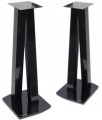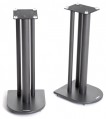Acoustic spikes
The presence of
acoustic spikes in the design of the stand.
Such spikes are pointed protrusions on which the structure rests during installation. To avoid damage to the floor, you can use special protective pads with such protrusions (colloquially — "pyataki"); some models are initially equipped with similar overlays, for others, protection must be purchased separately.
Anyway, both acoustic stands and various designs for Hi-Fi equipment can be equipped with spikes (see "Type"). Depending on the application, the function of such devices will also be different. So, in models for speakers, spikes reduce the area of contact with the floor, increasing pressure and providing the most rigid connection of the rack (and, through it, the speaker cabinet) with the supporting surface. Due to this, unnecessary ("parasitic") vibrations that occur in the speaker cabinet are extinguished, and the sound quality improves; more details about the specific nuances of using spikes for speakers can be found in special sources. In extensions for Hi-Fi cabinets, spikes can also perform another function — they work as clamps (for more details, see "Type"). And in fact, in the cabinets, this piece of equipment plays a predominantly decorative role. Also, in all cases, the spikes are usually made adjustable in height, which allows you to adjust the fulcrum to the unevenness of the floor.
Platform dimensions (WxD)
Dimensions of the platform used to install acoustics. In some stands, for which this parameter is also indicated, the clamp can play the role of a platform — in such cases, we are talking about the overall dimensions of the working area in the clamp.
It makes sense to pay attention to this parameter if the stand does not have a specialization for a specific brand of acoustics, or it is planned to be used with a “non-native” speaker (see “Speaker model”). In such cases, it is desirable that the dimensions of the platform coincide as closely as possible with the dimensions of the base of the speaker — otherwise distortion in the sound may occur. In addition, a speaker that is too small will look unaesthetic on the stand, and one that is too large will not have the necessary stability.
Height
General dimensions of the Hi-Fi pedestal (see "Type") in width and depth.
Recall that the depth in this case is the size from the front to the rear edge of the structure. In general, information about the dimensions is needed primarily in order to assess how much space you need to prepare for placing the cabinet and where it is better to put it. In addition, the overall width and depth determine how much shelf space will actually be available for mounting various equipment. However, the dimensions of this space are often specified separately in the characteristics — as the effective width and depth (see above); and when evaluating compatibility with various devices, it is best to use specialized dimensions rather than general dimensions. If the effective width and depth are not indicated in the specifications, it is worth proceeding from the fact that they are somewhere 150–200 mm smaller than the corresponding overall dimensions, and take the appropriate margin when selecting a cabinet for the existing components.
Weight
Total weight of the stand; in paired sets, it is indicated for each item separately.
It is widely believed among audiophiles that the heavier the design, the less “ringing” it is, the lower the likelihood of extraneous vibrations and the better the stand performs its functions. However, this is only partially true: manufacturers often use various design tricks (for example, an internal frame) to reduce weight without sacrificing quality.

